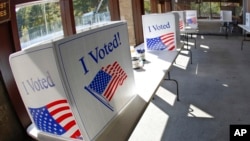"Is it good for the Jews?" That has been a question long asked by Jewish Americans, especially immigrants and those of the second generation, scarred by memories of the Holocaust, when assessing the policies of the U.S. government and the pledges of political candidates.
Most of them, most of the time since Franklin Roosevelt first ran for president in 1932, have voted for the Democrat at the top of the ticket.
Fast forward 92 years. More Jews have been voting Republican in recent elections, while many younger and left-leaning Jewish voters no longer see unequivocal support for Israel as a litmus test.
Instead, rising antisemitism is reforging a sense of Jewish self-identity — especially among those who consider themselves fully assimilated and accepted in the American mainstream culture.
Antisemitism “comes from all sides," said Rachel Sass, antisemitic incident specialist at the Anti-Defamation League's Center on Extremism. "There are right-wing extremists, left-wing extremists, anti-Israel protesters. There isn't necessarily a clear political or ideological bent, just antisemitism.”
There has been a 900% increase in the number of antisemitic incidents in the past decade, with a spike since the Israel-Hamas conflict blew up last year, according to the ADL.
Jewish Americans are further alarmed by chants on college campuses — in reaction to Israel's retaliatory strikes on Gaza following the October 7 Hamas terror attack — of "from the river to sea" and "go back to Poland,” along with some physical assaults on Jewish students.
"I've seen people respond with a level of fear, being afraid to reveal their Jewish identity. I've seen other people who have even leaned more into pride in their Jewish identity, wanting to be even more open because they feel that it's very important," said Sass.
Bestselling novelist Allison Winn Scotch said on the social media platform Threads, "Every day, as a Jewish American, I get increasingly nervous that we can't come back from the brink of this. I don't know where my family could go though, and I don't know how we would stay safe when we got there anyway."
She continued, "Your Jewish friends are living with a blooming seed of dread in the pits of our stomachs."
America provided a refuge for Eastern European Jews escaping 19th-century pogroms, who followed the emigration from the more established and prosperous German Jewish community.
Many Jews in the United States, however, did not feel totally accepted into broader American culture until the civil rights movement. Changes not only benefited Blacks but also removed remaining barriers to Jews — such as housing covenants and restricted country club memberships, as well as hiring discrimination at prestigious law firms and entry quotas at the Ivy League universities that such attorneys were drawn from.
The contemporary surge in antisemitism is not institutional.
"It's children being targeted at school with antisemitic bullying, synagogues being targeted with threats of bombs or shootings, people even being assaulted on the street because they are visibly Jewish or Orthodox," according to Sass at the ADL.
American Jews, as is the case with other ethnic or minority groups, do not wholly cast votes based on a single issue.
"We swing with the rest of the country around economic issues, war and peace and all kinds of issues," Mark Mellman, president of the Democratic Majority for Israel, told VOA.
The Republican Jewish Coalition's political and communications director, Sam Markstein, said, "I think this will be the first time for a lot of Jewish voters who've never even considered voting Republican in their lives seriously making that consideration this year because of the dereliction of leadership by the Biden administration on these issues."
Donald Trump, hoping for a second term as president but defeated by Joe Biden four years ago, received somewhere between one-fourth and one-third of the Jewish vote in 2020, according to several polls and Jewish organizations.
"Anybody who knows anything about Donald Trump knows that his alliances are based on people's commitment to him personally, not to a set of values, not to a set of strategic interests," said Mellman.
Republicans have done a better job than Democrats in condemning politicians in their respective parties who make antisemitic remarks, Markstein contended, pointing out the RJC supports primary challengers to Republicans in Congress who make such discriminatory comments.
"Unfortunately, there are too many on the Democratic side that don't seem to want to follow that path and want to either run and hide or issue mealy-mouthed responses that piss everybody off," Markstein told VOA.
Although Jews constitute only 2.4% of the U.S. adult population, they are more likely to vote than the general registered voting population and to make political donations.
"The Jewish vote in those [swing] states is going to be the decisive [factor]," Markstein predicted.
The Republicans tend to draw most of their Jewish strength from the religious Orthodox, the fastest-growing but still smallest Jewish community among the three largest denominations. Most Orthodox Jews strongly support Israel.
"Day after day, the administration's response gets less and less supportive of Israel," Markstein contended.
A majority of Conservative and Reform Jews tend to vote for Democrats and are more open-minded about a two-state solution in the Middle East that would create a sovereign Palestine.
"To retain Jewish support, Biden's campaign needs to keep doing exactly what they're doing — standing strong with Israel, against antisemitism and behind the American Jewish community," Mellman said. "That's exactly what I think American Jews are looking for at this very difficult time. It's exactly what the president is doing."
VOA White House Bureau Chief Patsy Widakuswara contributed to this report.















